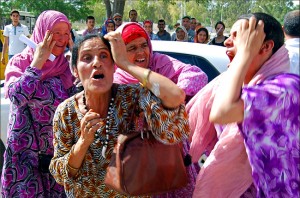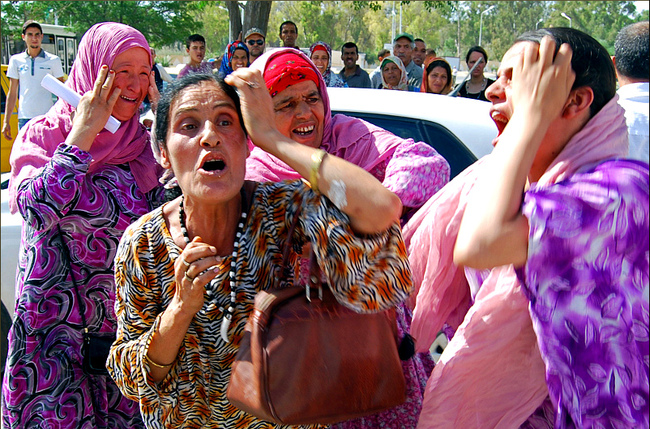 “Political differences were already paralysing the Maghreb,” says writer and terrorism analyst Isselmou Ould Mustapha. “The revolutions did the rest.”
“Political differences were already paralysing the Maghreb,” says writer and terrorism analyst Isselmou Ould Mustapha. “The revolutions did the rest.”
Between the shaky security in Libya, the Mali fighter diaspora, the rise of salafism, political discord in Tunisia and the on-going threat of “lone wolf’ terrorists”, the Maghreb region faces serious challenges.
Magharebia met with Journal Tahalil Director Isselmou Ould Mustapha, an expert on jihadist movements and terrorism, to find out what poses the greatest concern.
Magharebia: What is the current security situation in the Sahel and the Maghreb?
Isselmou Ould Moustapha: The French intervention in Mali has lessened the threat in the Sahel, but not significantly in Niger. It could re-emerge in Mali.
The situation in the Maghreb is worrying, especially in Jebel Chaambi in Tunisia and in southern Libya, where jihadist groups from Mali have taken refuge with the support of salafists from both of these transitional and unstable countries.
Magharebia: Has the centre of gravity for terrorism shifted, as some say, from northern Mali to Libya and Tunisia?
Ould Moustapha: The French military intervention destroyed the operational capacities of AQIM in northern Mali, where just a few residual groups such as MUJAO still have a presence.
Al-Qaeda-linked groups fled from the airstrikes and took refuge in southern Tunisia and Libya. Sources say they are also present in Niger, Chad and even Darfur.
Magharebia: What do the Touareg movements really want? And what about the drug traffickers and other criminals swarming Azawad?
Ould Moustapha: Complicity between Touareg movements and narco-terrorists is unproven. The Touareg problem is partly an issue of inter-community co-habitation between an Arab-Amazigh minority and an African majority, within a Malian state, which they accuse of racism and which accuses them of being involved with drugs.
Magharebia: From your point of view, what can Mauritania contribute to the UN mission in Mali?
Ould Moustapha: Mauritania can be useful to MINUSMA if it puts national security first, during its military interventions. It should not, however leave its borders unguarded or cut off the troops from their support bases and fall-back positions.
Magharebia: AQIM has not targeted Mauritania for some time. Some have even suggested that the Touaregs had something to do with this so-called “truce”. What do you say about that allegation?
Ould Moustapha: That is nonsense. The Touaregs were at war with AQIM, which drove them out of the towns of northern Mali. And the Touaregs co-operated with French troops in the hunt for AQIM fighters.
As for the “truce”, Mauritania, with its dynamic strategy and its pre-emptive actions, has pushed AQIM out of its territory. Its firmness has paid off.
Magharebia: Observers of the security situation in the southern Sahara often stress the link between terrorists and traffickers. What is really going on?
Ould Moustapha: The connection between organised crime and terrorism is indeed real. The task of recruiters, who go to mosques and talk in a provocative way about the situation in Afghanistan, Iraq and Israel, is above all else – including ideology – to raise funds through illegal smuggling.
Magharebia: What about the security situation in Tunisia and Libya? What is behind the rise in terrorist activity?
Ould Moustapha: In the wake of all of the revolutions, chaos is setting in. AQIM is taking advantage of the transitions under way in Tunisia and Libya.
Magharebia: What are other Maghreb nations doing to help these two countries? And how much security co-operation is there between the Maghreb states?
Ould Moustapha: Political differences were already paralysing the Maghreb. The revolutions did the rest.
The fact that there are three Islamist governments in Morocco, Tunisia and Libya and two governments of different kinds in Algeria and Mauritania does not augur well for security co-operation.
Over the last fifteen years, Algeria has struggled to get rid of radical Islamists. It is time for the Maghreb neighbours to unite in their fight against terrorism.
Magharebia: After being pushed out of northern Mali, do terrorists still have the same capacity to cause harm?
Ould Moustapha: Not in northern Mali. But we have seen that they have retained their capacity to cause harm elsewhere, with the attacks in Agadez and Arlit [Niger] in June 2013.
And then there are other unstoppable threats: self-radicalised individuals, lone wolves and undetectable explosives.
Interview by Bakari Gueye in Nouakchott for Magharebia – 16/08/2013







